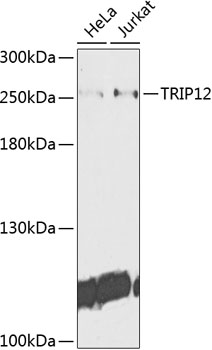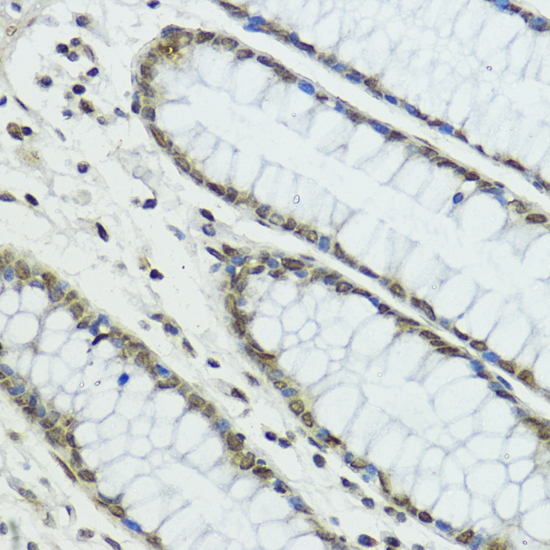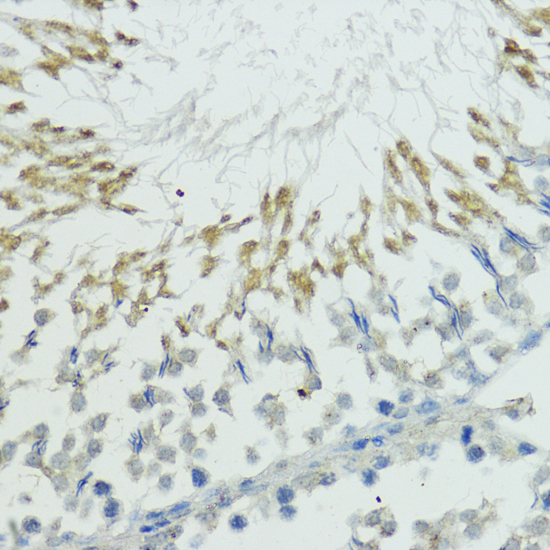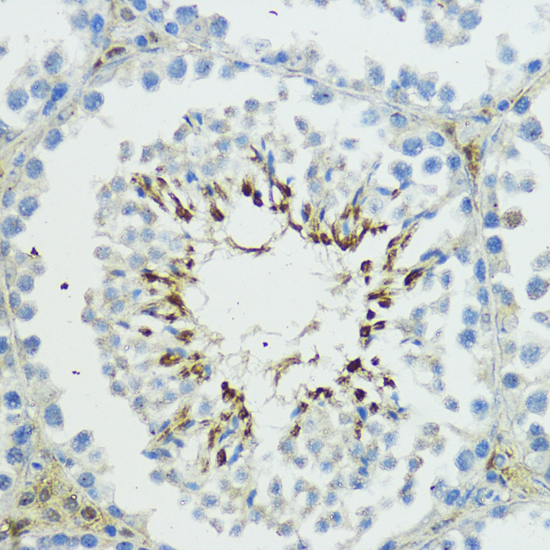-
Product Name
TRIP12 Polyclonal Antibody
- Documents
-
Description
Polyclonal antibody to TRIP12
-
Tested applications
WB, IHC, IF
-
Species reactivity
Human, Mouse, Rat
-
Alternative names
TRIP12 antibody; TRIP-12 antibody; ULF antibody; E3 ubiquitin-protein ligase TRIP12 antibody
-
Isotype
Rabbit IgG
-
Preparation
Antigen: Recombinant fusion protein containing a sequence corresponding to amino acids 1-240 of human TRIP12 (NP_001271143.1).
-
Clonality
Polyclonal
-
Formulation
PBS with 0.02% sodium azide, 50% glycerol, pH7.3.
-
Storage instructions
Store at -20℃. Avoid freeze / thaw cycles.
-
Applications
WB 1:500 - 1:1000
IHC 1:50 - 1:100
IF 1:50 - 1:100 -
Validations

Western blot - TRIP12 Polyclonal Antibody
Western blot analysis of extracts of various cell lines, using TRIP12 antibody at 1:1000 dilution._Secondary antibody: HRP Goat Anti-Rabbit IgG (H+L) at 1:10000 dilution._Lysates/proteins: 25ug per lane._Blocking buffer: 3% nonfat dry milk in TBST._Detection: ECL Enhanced Kit ._Exposure time: 30s.

Immunohistochemistry - TRIP12 Polyclonal Antibody
Immunohistochemistry of paraffin-embedded human colon using TRIP12 antibody at dilution of 1:100 (40x lens).

Immunohistochemistry - TRIP12 Polyclonal Antibody
Immunohistochemistry of paraffin-embedded rat testis using TRIP12 antibody at dilution of 1:100 (40x lens).

Immunohistochemistry - TRIP12 Polyclonal Antibody
Immunohistochemistry of paraffin-embedded mouse testis using TRIP12 antibody at dilution of 1:100 (40x lens).
-
Background
E3 ubiquitin-protein ligase involved in ubiquitin fusion degradation (UFD) pathway and regulation of DNA repair. Part of the ubiquitin fusion degradation (UFD) pathway, a process that mediates ubiquitination of protein at their N-terminus, regardless of the presence of lysine residues in target proteins. In normal cells, mediates ubiquitination and degradation of isoform p19ARF/ARF of CDKN2A, a lysine-less tumor suppressor required for p53/TP53 activation under oncogenic stress. In cancer cells, however, isoform p19ARF/ARF and TRIP12 are located in different cell compartments, preventing isoform p19ARF/ARF ubiquitination and degradation. Does not mediate ubiquitination of isoform p16-INK4a of CDKN2A. Also catalyzes ubiquitination of NAE1 and SMARCE1, leading to their degradation. Ubiquitination and degradation of target proteins is regulated by interaction with proteins such as MYC, TRADD or SMARCC1, which disrupt the interaction between TRIP12 and target proteins. Acts as a key regulator of DNA damage response by acting as a suppressor of RNF168, an E3 ubiquitin-protein ligase that promotes accumulation of 'Lys-63'-linked histone H2A and H2AX at DNA damage sites, thereby acting as a guard against excessive spreading of ubiquitinated chromatin at damaged chromosomes.
Related Products / Services
Please note: All products are "FOR RESEARCH USE ONLY AND ARE NOT INTENDED FOR DIAGNOSTIC OR THERAPEUTIC USE"
